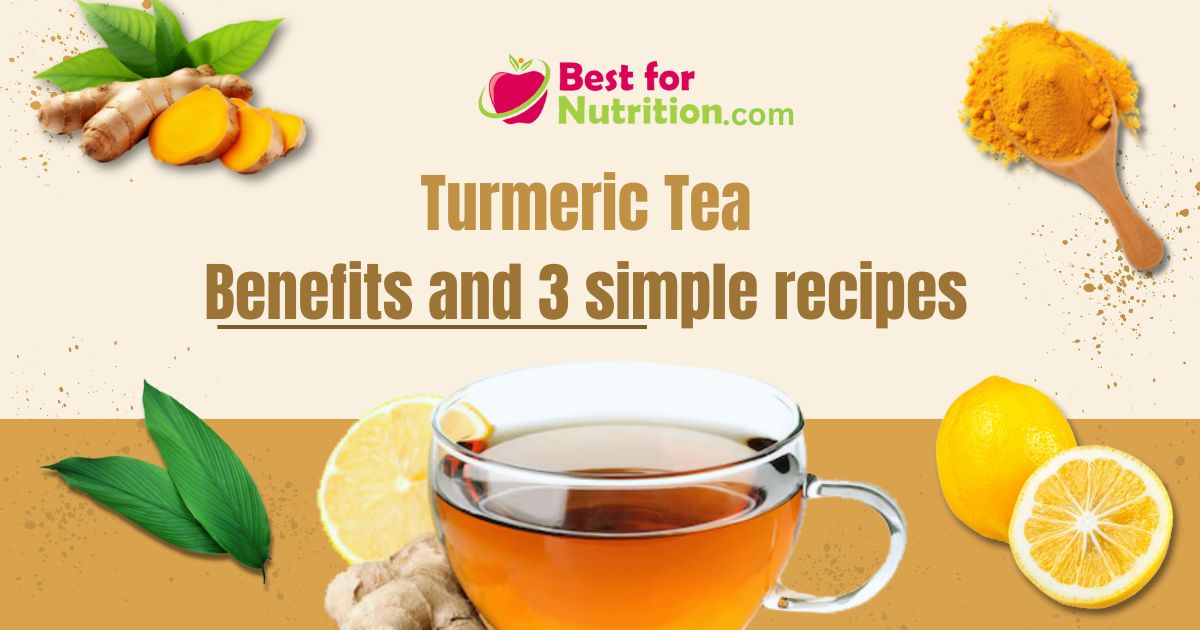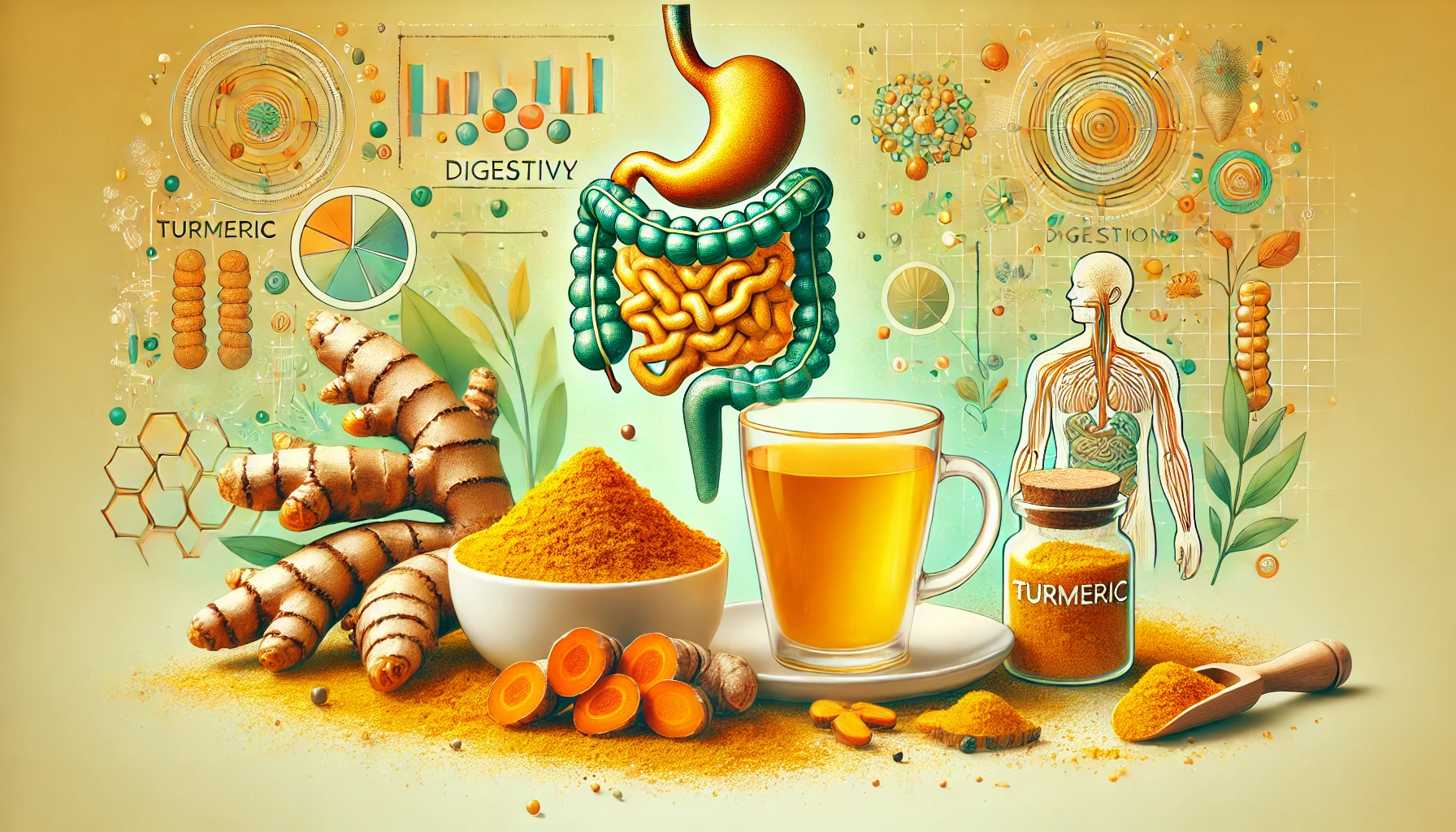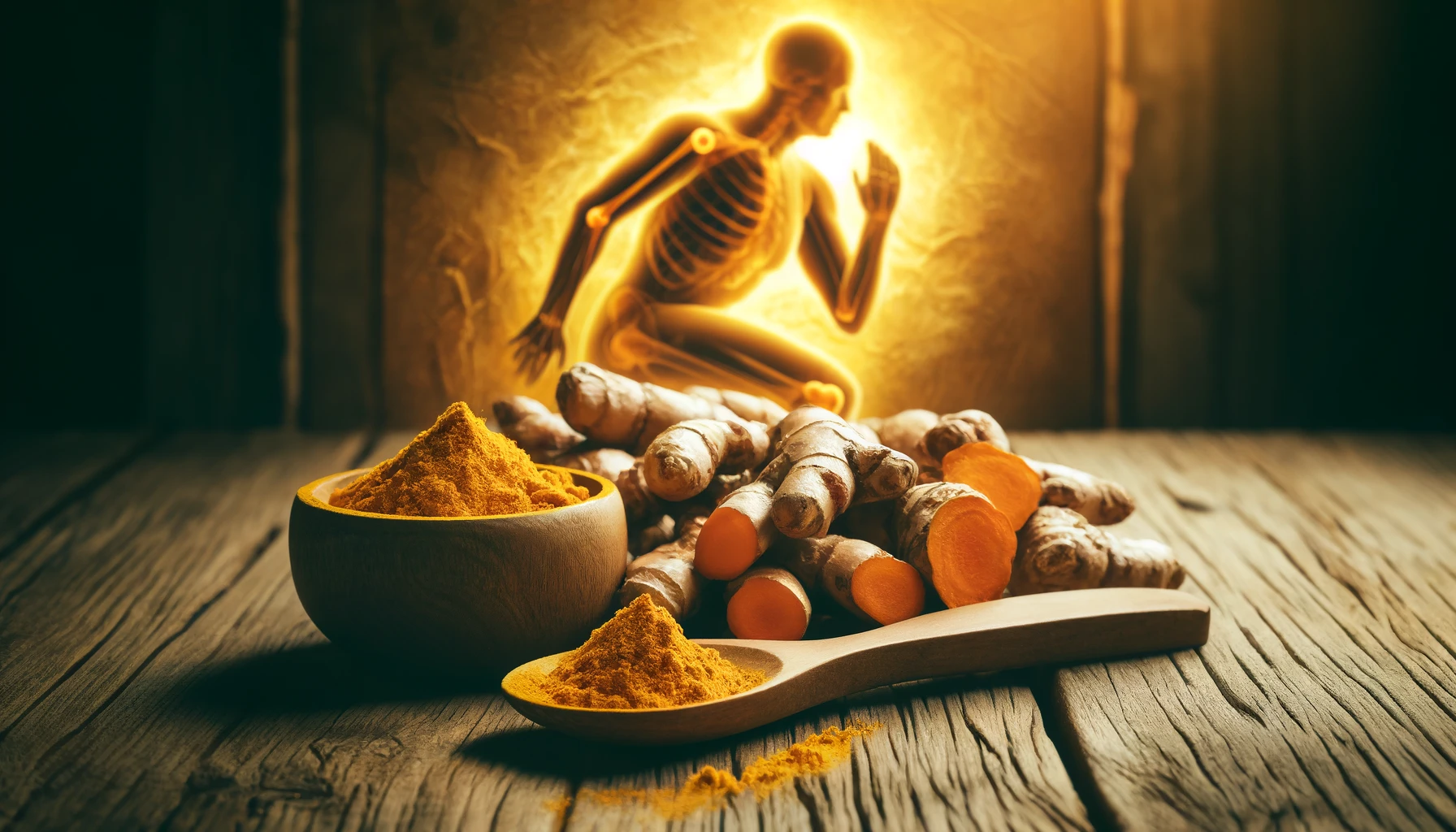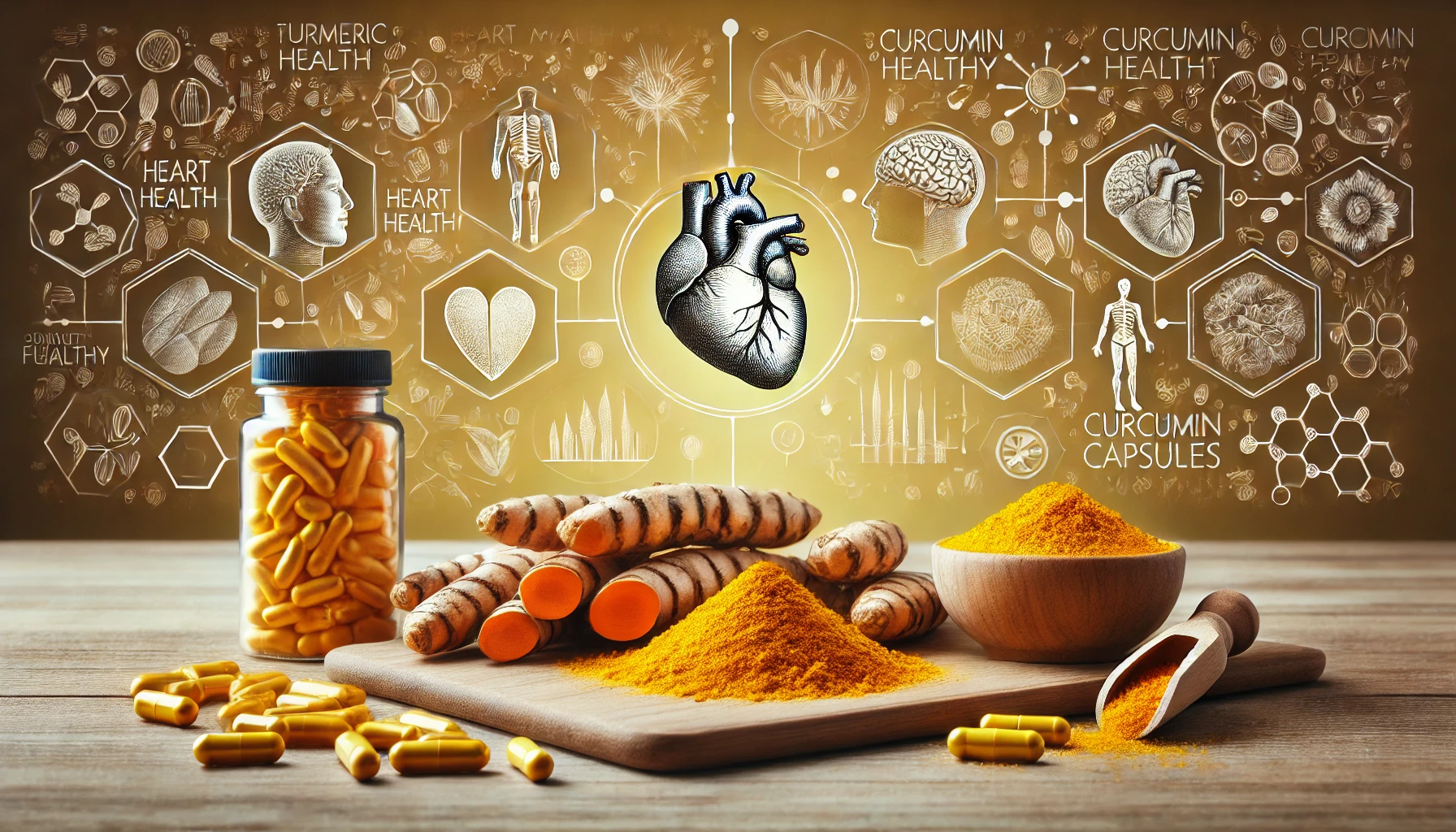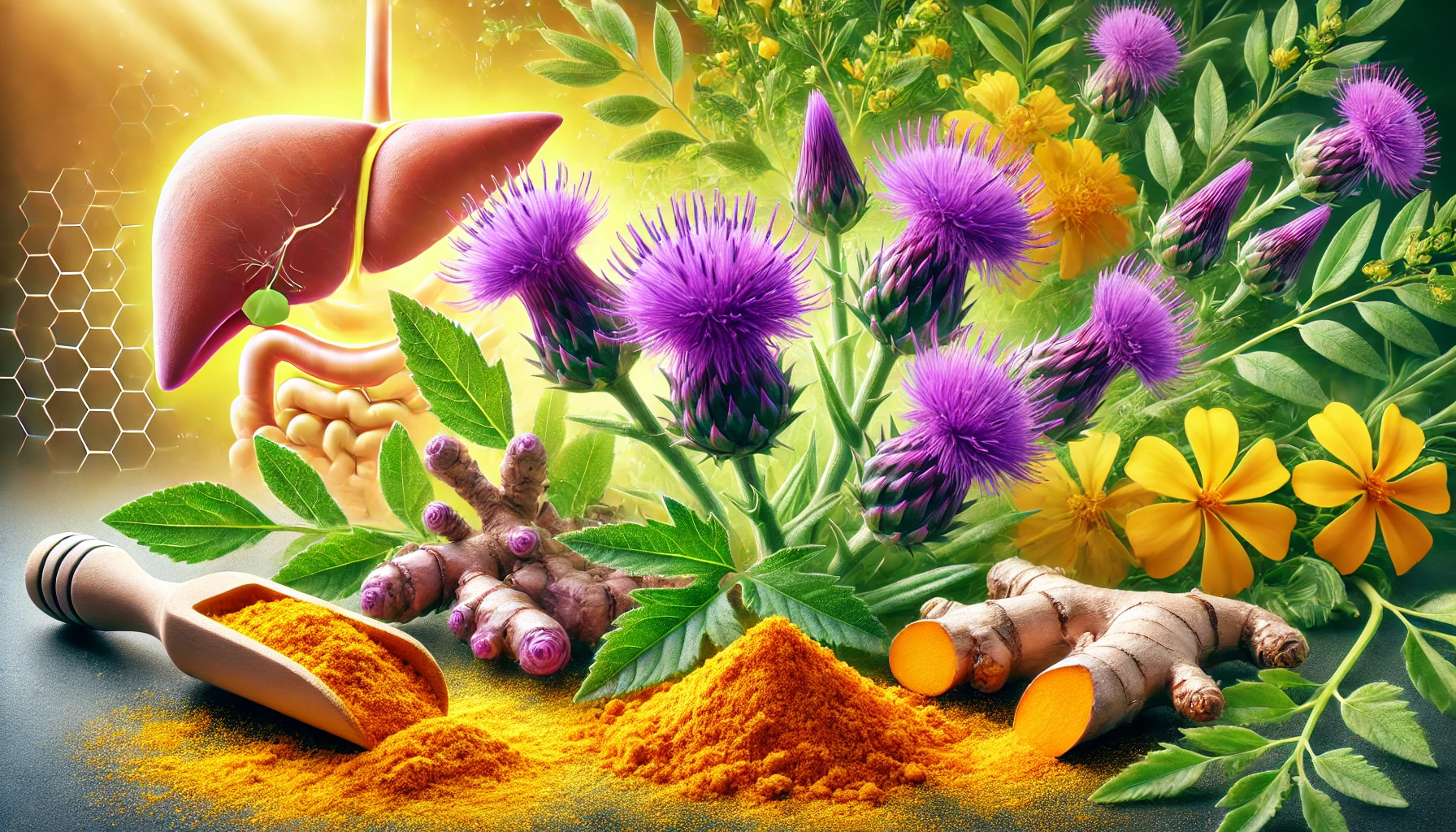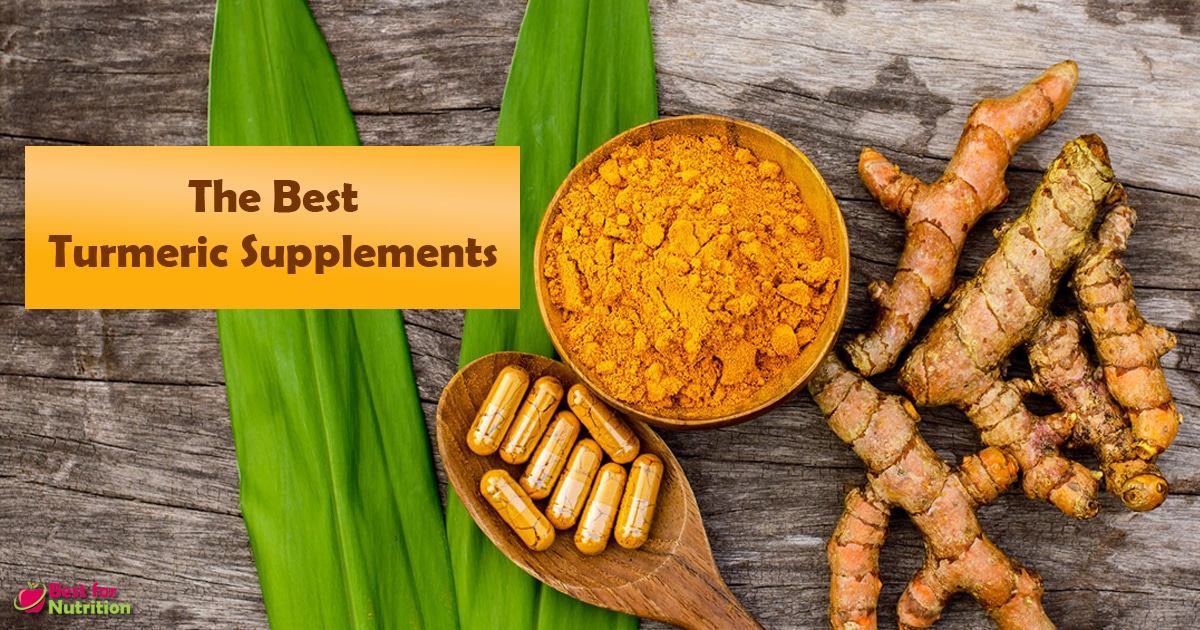Traditionally used in cooking, and religious ceremonies in the Indian subcontinent for thousands of years, turmeric referred to as ‘Indian saffron’, has a special status in the medicinal domain owing to its unique healing properties.
A lot of health claims are now being made about this golden spice! Not only has turmeric increased in popularity, but it has also achieved a place for itself among the top-ranking health supplements.
Turmeric is rich in many chemical compounds, antioxidants, oils, and vitamins, but curcumin, a phytochemical, is the one that is most researched and well-known for its potential to treat a variety of medical conditions.
So, is turmeric research-backed for its so-called health benefits? Does the turmeric and curcumin combination act as a powerful disease-fighter?
Read on to find the answers and know so much more as to the composition of turmeric, dosage, timings, and different benefits in this complete guide on turmeric.
- What is Turmeric?
- What is Curcumin?
- Turmeric vs Curcumin
- Bioavailability of Turmeric
- Dosage for Turmeric
- Best Time to Take Turmeric
- Scientifically Proven Benefits of Turmeric
- Supplementation Forms
- The Risks and Side-Effects of Turmeric
- FAQs
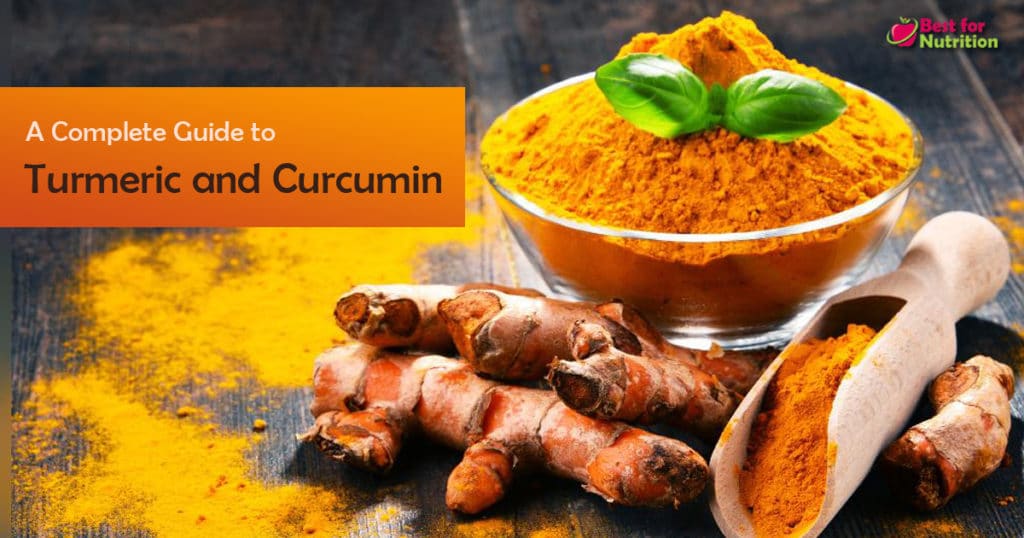
What is Turmeric?
Turmeric, a popular spice recognized by its distinct yellow color, is a rhizome or root of the Curcuma longa plant grown primarily in the Indian subcontinent and few Southeast Asian countries.
Did you know that turmeric belongs to the family of ginger, another well-renowned spice?
A common ingredient in traditional Ayurvedic and Chinese medicines, turmeric has been used for more than 4000 years till date to treat a variety of ailments such as inflammation, skin disorders, diabetes, and even cancer (1).
Nutritional Composition
One tablespoon (about 9.4 g) of ground turmeric contains: (2)
- 29.3 calories
- 6.31 g – carbohydrates
- 0.91 g – protein
- 0.305 g – fat
- 2.13 g – fiber
Apart from the macronutrients, turmeric contains vitamin B6, C, and considerable quantities of minerals such as 196 mg potassium, 28.1 mg phosphorus as well as calcium, iron, manganese, and zinc.
Turmeric is loaded with as many as 100 components. Chief among them are volatile oils such as turmerone and curcuminoids made up of curcumin demethoxycurcumin, 5’-methoxycurcumin, and dihydrocurcumin.
While turmerone oils are responsible for the aromatic nature of turmeric and have significant anti-inflammatory and other pharmacological properties, curcuminoids are effective antioxidants and provide turmeric its vivid yellow color (3), (4).
Besides containing 4 kinds of polysaccharides, turmeric is also rich in omega-3 fatty acids and alpha-linolenic acid with zero cholesterol.
Summary: Turmeric, a rhizome of the Curcuma longa plant has been used in traditional medicine. It contains nearly 100 components including turmerone oils and curcuminoids which are proven to have many medicinal properties.
What is Curcumin?
Curcumin is the champion among turmeric’s many compounds! It makes up a part of the potent curcuminoids and is the contributor to turmeric’s bright yellow color (5).
The presence of curcumin in pure turmeric averages around 3% by weight. Curcumin incurred through daily diet has poor bioavailability and hence may be recommended as supplements in higher concentrations (6).
Extra ingredients such as piperine available in black pepper extracts or healthy fats that support better absorption are common additions in turmeric supplements that provide better bioavailability of curcumin in the body.
Curcumin is the highest researched component of turmeric and various clinical trials have indicated curcumin’s efficiency in treating inflammatory conditions, skin diseases, cardiac conditions, Irritable Bowel Syndrome (IBS), Alzheimer’s, etc.
Summary: Curcumin, one the main curcuminoids in turmeric, may be prescribed in supplement form for better efficiency. Numerous research and clinical trials highlight its benefits in treating various medical conditions.
Turmeric vs Curcumin
Turmeric versus curcumin is a long-debated topic as to which of them is more beneficial. Is turmeric more potent than curcumin? Or, is curcumin responsible for turmeric’s healing properties?
To find the answers, let’s look at the common and individual benefits of turmeric and curcumin.
Benefits Common to Turmeric and Curcumin
Turmeric has many natural components present, but the most active one among them is curcumin. Turmeric as a whole and curcumin have therapeutic properties that help provide several health benefits.
Scientific studies on turmeric and curcumin extracts have shown them to help treat medical conditions such as osteoarthritis, lowering the risk of heart disease by regulating lipid levels, and managing blood sugar levels (7), (8), (9).
Research has also revealed that turmeric and curcumin can protect against liver damage, fight cancer with chemopreventive activity, and exert protective antifungal and antibacterial effects (10), (11), (12), (13).
The Potential Benefits of Curcumin
Curcumin is the most powerful among the many turmeric compounds that have been found to have properties of its own to benefit human health.
Recent studies have revealed that curcumin may be important and effective in the prevention and treatment of diabetes and its associated disorders. While studies on rats have shown that curcumin is more effective in treating diabetes mellitus than turmeric, it is thought to be equally true in humans (14), (15).
Research on curcumin has revealed that curcumin exerts anti-inflammatory effects in treating chronic diseases through the downregulation of inflammatory transcription factors (nuclear factor kappaB), enzymes, and cytokines (16).
A daily dose of 6 g of curcumin when supplemented along with 60 mg piperine 48h before and 48h after exercise-induced muscle damage was shown to enhance muscle recovery after 24 h to 48 h after exercise (17).
The Potential Benefits of Turmeric
Turmeric has displayed significant prowess in treating several medical conditions, along with curcuminoids and several essential oils it possesses.
Turmeric (Curcuma) and it’s extracts containing curcuminoids and oils are considered beneficial in the treatment of age-related disorders such as dementia and may help in treating complications arising due to diabetes mellitus (18).
The anti-inflammatory and antioxidant properties of turmeric may be beneficial in slowing down the brain aging process and lowers the risk of possible neurodegenerative disorders.
Experiments with 8 turmeric compounds (including curdione, isocurcumenol, curcumenol, curzerene, β-elemene, curcumin, germacrone, and curcumol) on 11 fungi revealed that all exhibited antifungal properties but curdione had the highest inhibitory effect (19).
Research also indicates that turmeric, like curcumin, has been shown to suppress inflammation-causing factors such as nuclear factor kappa B (NF-κB), signal transducers, and activators of transcription 3 (STAT3) to inhibit an increase in tumor cells and protect from bone loss (20).
Turmeric or Curcumin: Which One is More Beneficial?
Curcumin and turmeric have shown individual capabilities as well as combined competence in treating several disorders. While curcumin is well researched, turmeric has also shown efficiency with several other compounds.
So if you are asked to choose, the wise option would be to go in for a supplement that contains good quality turmeric extracts but with a higher concentration of curcumin for combined effectiveness and better results.
Summary: Turmeric and curcumin individually and together have shown effectiveness in treating various medical conditions. Turmeric extracts with a higher curcumin percentage may be a better choice to enjoy greater benefits.
Bioavailability of Turmeric
The bioavailability of turmeric and curcumin when obtained through diets is quite low as both quantity and absorption are limited.
For this purpose, many turmeric supplements use ingredients such as black pepper, lecithin, and healthy fats that help enhance the bioavailability of turmeric and its components to the human body.
- Dietary Fats: Turmeric was a staple in South East cuisines and was included in curries or fatty foods! The reason for this was fat-soluble turmeric used in conjunction with healthy fats increased aroma, flavor, and best of all increased the bioavailability of turmeric to the body (21).
- Black Pepper: Black pepper can simply spice up your food with an extra zing! Additionally, studies have shown that the piperine in black pepper makes the curcumin 2000% more bioavailable to the body (22).
Black pepper is added to supplements to make turmeric and curcumin more available to the body by inhibiting the quick breakdown of turmeric compounds.
- Lecithin: Soy lecithin, a plant-based additive, is extracted from soy and used as a food additive in dietary supplements. Research has shown that soy lecithin can enhance the bioavailability of curcumin.
A 2018 study showed that a complex of curcumin and lecithin exerted anti-inflammatory effects similar to curcumin and increased bioavailability of curcumin itself (23).
Summary: Turmeric has low bioavailability when consumed via a daily diet. Turmeric supplements can be taken with fatty meals or using products with ingredients such as black pepper and lecithin that increases the bioavailability.
Dosage for Turmeric
Turmeric has been used as a medicinal aid for ages. Supplementation of turmeric depends on the medical condition for which it is recommended and hence the dosage can vary accordingly.
The World Health Organization (WHO) has identified 0-3 mg/kg of curcuminoids as an acceptable range for use as a food additive. The FDA too has approved turmeric and its compounds to be safe for consumption (24).
Randomized clinical trials have indicated that supplements of turmeric extracts with 1 gram of curcumin taken for 8-12 weeks may have efficiency in reducing pain and inflammatory symptoms of arthritis (25).
So far, no maximum tolerated dose for turmeric has been established, but studies have shown that turmeric with curcumin appears to be safe even at doses of 12,000 mg during a chemopreventive intervention (26).
Another study on overweight subjects with hyperlipidemia showed that 1.4 g of turmeric extracts taken in two divided doses before meals for 90 days helped to significantly lower total cholesterol, LDL, triglycerides, and VLDL values (27).
An 8-week study on the efficiency of black seeds (900 mg) and turmeric (1.5 g) combination per day on males with metabolic syndrome revealed improvement in parameters such as body fat percentage, fasting blood sugar, triglycerides, LDL, C-reactive protein, and increased good HDL (28).
Summary: Dosage of turmeric varies on the medical condition for which it is being used. Various studies highlight the different doses of turmeric used for treating different conditions including arthritis, hyperlipidemia, and cancer.
Best Time to Take Turmeric
So, now that we know that the dosage for turmeric varies according to the health condition for which it is taken, another important question asked is “What is the right time to take a turmeric supplement?”
The benefits of turmeric are best achieved by taking the right doses of the supplement at the appropriate time.
Turmeric supplements work best when taken on an empty stomach to maximize absorption. These supplements can be taken either in the morning or at bedtime for relief from inflammation-related conditions.
Some individuals can experience stomach irritation while taking turmeric supplements. Such people are recommended to take turmeric supplements with meals to avoid discomfort.
Summary: Turmeric supplements taken on an empty stomach increase absorption into the body. It can be consumed with meals to avoid stomach discomfort.
Scientifically Proven Benefits of Turmeric
Turmeric, a simple kitchen spice has been used regularly in cooking and traditional medicine to treat several medical conditions such as inflammation, skin diseases, and viral or bacterial infections for ages.
Modern medicine too as seen in studies acknowledge turmeric’s potent antioxidant and anti-inflammatory properties as a safe and effective method to combat medical disorders such as diabetes, depression, arthritis, and cancer (29).
Though the uses of turmeric are many, listed below are some of the potential benefits of using turmeric.
Turmeric for Immunity
Factors such as an unhealthy lifestyle, medical conditions, environmental pollutants, and self-neglect can destabilize and harm the body’s immune system which helps fight us against germs and other disease-causing microorganisms.
Turmeric, a natural and potent spice was used in Ayurvedic medicines and was an integral part of the Indian way of life. Turmeric was used everywhere – in recipes, homemade herbal concoctions, and as topical applications.
Turmeric milk, a tasty warm beverage prepared using turmeric, milk, pepper, and honey was the go-to solution for getting relief from cold, cough, fever, skin diseases, and for boosting overall immunity.
So how does turmeric boost immunity?
Turmeric helps to fortify the immune system through its immunomodulating properties. Studies on turmeric show that it modulates fighter cells such as T cells, B cells, macrophages, neutrophils, and dendritic cells to protect the body and keep harmful diseases at bay (30).
Even the essential oils extracted from turmeric have displayed antioxidant properties that help prevent oxidative stress, free radical damage, and boost immunity (31).
Summary: Turmeric was used in Ayurvedic medicines and Indian homes to boost immunity. Science has proved that turmeric compounds including the volatile oils, help modulate disease-fighting cells to protect the body.
Turmeric and Anxiety
Stress is a common companion in today’s hectic lifestyles and anxiety is the first response to stress. With time, they spiral out of control to lead to complications such as depression or other mental illness.
Natural stress relievers such as turmeric, green tea, chamomile, and chocolate are being used to relieve anxiety on their own or if severe, in tandem with medications.
So, how does turmeric help in relieving anxiety?
In the Indian sub-continent turmeric is often consumed with warm milk and honey at night to relieve stress and induce sleep. This is considered as a natural preventive measure to avoid the risk of mental disorders.
Turmeric and it’s primary compound curcumin has been studied and found to work as follows:
- Increased anxiety levels can lead to mood disorders such as depression. Recent trials and studies indicate that people with depressive disorders have elevated inflammation in parts of the brain (32).
Turmeric is well known to possess potent antioxidant and anti-inflammatory properties that have shown to relieve anxiety and improve mood in people with major depression (33).
- Research suggests that turmeric can act as an excellent anxiety reliever. Turmeric has shown promise and efficiency in acting as an effective stress buster and relieving anxiety and depressive symptoms in both animal and human studies (34), (35).
- Along with antidepressants, curcumin, when taken with piperine to enhance the bioavailability, displayed enhanced anti-depressant effects with increased levels of serotonin (5-HT) to better manage depression (36).
- Curcumin has been shown to boost DHA (docosahexaenoic acid) from its precursor ALA (alpha-linolenic acid). The deficiency of DHA can contribute to increased anxiety and other cognitive issues (37).
- Oxidative stress can trigger anxiety and lead to depressive disorders. Glutathione is an antioxidant found in plants that helps fight against oxidative stress and prevents damage caused by free radicals.
Glutathione reductase 1, a gene involved in antioxidant metabolism, helps control anxiety and depressive symptoms. Studies indicate that curcumin is capable of exerting antioxidant effects by modulating glutathione levels effectively (38).
Summary: Turmeric and its main component curcumin has shown to reduce anxiety and depressive symptoms by using its potent antioxidant and anti-inflammatory properties. It boosts DHA and glutathione levels to reduce free-radical damage and increases serotonin levels in the brain.
Turmeric and Thyroid Function
Turmeric as a medicinal spice is used to treat various medical conditions efficiently.
A common medical condition prevalent among billions of people is of the thyroid gland. The thyroid, a vital part of the endocrine system, releases hormones that regulate metabolic processes in the human body.
Therefore, any discrepancies in the thyroid function can be devastating for health. And the use of turmeric may help alleviate thyroid-related issues. How?
Read on to know how the use of turmeric helps with the thyroid function.
- Curcumin, one of the active compounds of turmeric has been shown to improve auto-immune diseases such as rheumatoid arthritis, inflammatory bowel disease, etc. by regulating inflammatory cytokines.
Graves’s disease is an autoimmune disease of the thyroid gland and 131-radioiodine has been vastly used to treat this condition. Curcumin seems to exert protective effects against the damage and side-effects caused by the use of 131-radioiodine (39).
- Thyroiditis refers to inflammation of the thyroid gland. Hashimoto’s disease is a disease of the thyroid characterized by high inflammation. Studies show that curcumin can help in reducing inflammation and slow down or halt such conditions (40), (41).
- Hyperthyroidism or increased state of thyroid hormones can create multiple health issues. High thyroid levels can disrupt antioxidant levels in the body resulting in increased oxidative stress in the brain.
Curcumin in animal studies has been shown to enhance the level of antioxidant enzymes that reduce oxidative stress in the brain caused by hyperthyroidism (42).
- Hypothyroidism or deficiency of thyroid hormones results in an increased level of cholesterol and blood lipids that may result in a higher risk of cardiovascular diseases.
Antioxidants present in turmeric extracts along with vitamin C and E supplementation have shown to have a positive impact on the thyroid gland by reduced suppression of T3 and T4 hormone levels and reduced cholesterol levels (43).
- Goiter is an inflammation of the thyroid gland and is caused by iodine deficiency. Research suggests that the use of turmeric can reduce the risk of goiter effectively (44).
- Scientific studies also affirm that curcumin can prevent the proliferation of tumor cells and this helps in lowering the risk of thyroid cancer (45).
- Thyroid hormones have a major influence on brain functions and an imbalance can affect cognitive functioning and increase the risk of mental disorders (46).
Aging is also a factor that can affect thyroid hormones and elevated levels can increase oxidative stress, which in turn increases the risk of neurodegenerative diseases (47).
Curcumin has already shown the capability to reduce oxidative stress and slow down brain cell damage that could prevent the onset or reduce the severity of various neurodegenerative diseases (48).
Summary: Thyroid is a major gland that controls various processes in the body for metabolic health. Imbalances in the thyroid can lead to various health issues. Curcumin as seen in studies has shown to improve symptoms and treat thyroid-related disorders with proven anti-inflammatory and antioxidant effects.
Turmeric for Hair
Hair, the crowning glory of many, is the part that is exposed to pollution, chemicals, neglect, etc.
Hair loss and other problems can occur with improper care, age, or an underlying medical condition. A balanced and nutritious diet with proteins, vitamins, minerals, may help strengthen the hair.
But sometimes just addressing nutritional deficiencies may be insufficient to tackle all hair problems and the root cause of the problem can be treated.
The incorporation of natural remedies has found favor among many people as they contain no side-effects. Turmeric has been used for ages as part of home remedies to address various hair problems.
Let us look at some of how turmeric addresses hair problems.
- Antibacterial effects: Turmeric with its powerful compounds can have healing properties that protect the scalp against bacterial infections.
Folliculitis is a skin disease that can affect hair follicles. Turmeric’s active compound curcumin can act against Staphylococcus aureus, a bacteria that is seen to cause folliculitis (49).
- Antioxidant properties: Oxidative stress can affect hair follicles and accelerate aging-related problems in hair. Turmeric’s proven antioxidants can reduce oxidative stress and free radical damage that cause potential damage to the hair (50).
- Lowers inflammation: Excess oil, itching, etc. can result in scalp infections with redness, inflammation, and sores. Turmeric’s anti-inflammatory properties, especially that of curcumin, can help cleanse and deal with such infections.
- Treats Dandruff: Oily scalp, fungal infections, dry skin, etc can cause dandruff which is a dreaded problem for many. Turmeric oil or paste can be applied on the scalp to cleanse the hair. The antifungal properties of turmeric may help treat dandruff effectively.
- Inhibits Hair Loss: Hair loss is a common global issue and many people resort to different remedies to prevent hair loss. Minoxidil (MXD) is a drug that has been known to provide relief and promote hair growth.
A study on the combination of curcumin and minoxidil has shown to be effective in promoting hair growth. It is also seen that curcumin causes better penetration of MXD for better efficiency (51).
- Treats Psoriasis: Psoriasis is an inflammatory skin condition that can occur on the scalp. A 2018 study has shown that turmeric tonic indicated the capability to exert anti-inflammatory effects to treat psoriasis effectively that in turn reduces hair fall (52).
- Use as a Natural Dye: Turmeric has been used thousands of years ago for cooking, medicinal, and cosmetic purposes. Its use as a natural dye for hair is well known and prevalent as it protects the hair from infections, itching, and lends a golden hue to it too.
Summary: Turmeric has been used to address various hair problems such as hair loss, thinning, dandruff, and psoriasis. It’s anti-bacterial, anti-fungal and anti-inflammatory properties help resolve hair issues and as a cosmetic acts as a natural hair dye.
Turmeric for Sinus
Turmeric, a simple but potent spice has been used to treat a horde of medical conditions for multiple decades. One of the most common reasons for using turmeric was to treat cold and cough arising due to sinusitis.
Sinus infection or sinusitis affects nasal cavities. Usually caused by a virus, inflammation with cold, headaches, nasal congestion is common in this infection.
Curcumin which has anti-inflammatory effects has been shown to fight against inflammatory cytokines to provide relief from this infection (53).
Commercial turmeric supplements of up to 500 mg can be used or as advised by a practitioner, to get relief from sinusitis. Home remedies of ground turmeric root along with honey, pepper, etc have also shown efficiency in relieving sinus infection.
Summary: Turmeric containing anti-inflammatory properties can help treat sinusitis, an infection caused in the nasal cavities. Turmeric supplements or turmeric roots with other ingredients can be used to obtain relief from sinusitis.
Turmeric for Gout
Gout is a type of arthritis characterized by inflammation, redness, and pain in the joints that occurs due to an excess of uric acid in the body.
Turmeric, famed for its anti-inflammatory properties is seen as a useful natural remedy to bring relief from inflammatory diseases including gout. Some of the ways how turmeric can be useful to provide relief from gout are:
- Reduce Uric Acid Levels – Excess of uric acid or monosodium urate (MSU) crystals accumulate in the joints especially in the big toe leading to severe pain and inflammation. The use of turmeric is seen to alleviate this condition (54).
Scientific studies show that turmeric can significantly reduce uric acid levels that give rise to gout in the first place and help in the management of this disease (55).
- Lowers Inflammation – Turmeric has several powerful compounds that have healing properties to tackle pain and inflammation. Curcumin in turmeric possesses effective antioxidant and anti-inflammatory properties that fight free radicals causing inflammation and reduces pain and swelling in gout.
- Effective Painkiller – Turmeric acts as a natural painkiller that is free from any side effects. It promotes faster healing, lowering swelling quickly, and brings effective relief from intense pain compared to proven chemical painkillers.
- Promotes Weight Loss – Obesity is known to elevate levels of uric acid and increase the risk of hyperuricemia and gout (56).
Studies have shown that turmeric can accelerate weight loss, This can be useful to restore metabolic health and prevent health risk for major health disorders (57).
Turmeric for gout can be taken in multiple ways. Include it in food preparation for that nice color, aroma, and health. You can also take turmeric with milk or add it to your smoothies.
Supplements of turmeric are available as an easy option too. Topical applications of turmeric mixed with oil for better absorption helps relieve joint pain effectively.
Summary: Turmeric has anti-inflammatory and antioxidant properties that help deal with conditions like gout. By reducing uric acid levels, acting as a potent pain reliever with no side effects, and accelerating weight loss, turmeric helps to manage metabolic health and gout better.
Turmeric and Male Enhancement
Turmeric has been used since traditional times to treat myriads of health conditions.
One of the least common but recently proven benefits of turmeric is its ability to treat sexual issues, especially in men.
Here is a list of how turmeric can benefit men’s sexual health.
- Treats Erectile Dysfunction (ED): A common but sensitive subject in men, natural solutions such as turmeric is proven safe and effective to treat ED in men.
Studies have indicated that curcumin in turmeric and novel curcumin derivatives (NCD) have prolonged efficiency in increasing erectile functioning for a longer duration than using only tadalafil, a medication that is commonly used to treat ED (58).
- Enhances Prostate Health: Turmeric’s active component curcumin has been studied for effectiveness in prostate health. It has been shown to inhibit prostate-specific antigens to prevent the risk of prostate cancer (59).
- Boosts Sperm Motility: Curcumin from Chinese Zingiberaceae and zedoary turmeric has potent anti-inflammatory and antioxidative effects.
Research suggests that curcumin prevents oxidative damage and improves sperm motility in patients with leukocytospermia, a condition characterized by high white blood cells in the semen that can cause male infertility (60).
Summary: Curcumin and its derivatives as suggested by studies can aid in treating erectile dysfunction and sperm motility in males. Curcumin has a proven ability to prevent an increase in cancer cells which can prevent prostate cancer.
Other Health Benefits of Turmeric
The benefits of turmeric are endless owing to its many health-benefiting properties. Other than the benefits listed above, turmeric has also been proven effective to treat several other health disorders such as:
- Diabetes: Diabetes affects millions of people globally and is a major factor in enhancing the risk of other health disorders.
Turmeric’s active ingredient curcumin has been studied intensively to show that it can help with diabetes and other conditions that could arise due to diabetes (61).
- Lipid Control: Lipids are fat-like substances present in the blood and tissues of the human body. These lipids are a measure of cardiovascular risks. High levels of certain lipids such as LDL and VLDL cholesterol are bad and need to be regulated to avoid the risk of heart diseases.
Studies have shown that supplementation of curcumin can lower levels of serum lipid peroxides (oxidative damage on lipids), reduce total cholesterol, and increase HDL (good) cholesterol (62).
- Obesity: It is a major health condition that affects millions of people in the USA. High-fat and high-sugar diets can intensify obesity and lead to heart disease. Losing weight, mainly fat loss, then becomes the primary concern.
Weight loss through plant-based products such as green tea, turmeric, garcinia cambogia, etc. has gained a reputation as they have negligible side effects. Scientific data supports turmeric’s capability to induce lipolysis or the breaking down of fats to result in weight loss (63).
- Cardiovascular Diseases (CVD): CVDs are those diseases that relate to the heart or blood vessels caused by several factors.
Many studies on turmeric and curcumin indicate that it helps to lower the risk of heart disease by controlling risk factors such as lipid and glucose levels and using its anti-inflammatory and antioxidant properties to fight free radical and prevent oxidative damage that increases the risk of CVDs (64), (65).
- Cancer: A disease where abnormal/ diseased cells multiply and destroy the rest of the tissues in the human body. Since there is no permanent cure for cancer, natural remedies such as turmeric are much sought-after.
Research has indicated that curcumin may exert anti-cancer effects by acting on cell signaling pathways that may be beneficial in treating several types of cancer (66).
- Digestive Disorders: Turmeric especially curcumin with its anti-inflammatory and other therapeutic properties has shown great potential in research to bestow beneficial effects in several digestive disorders (67).
Curcumin can also be effective in preventing oxidative stress that can cause liver disorders and prevent liver injury (68).
- Skin Disorders: Traditional home remedies in India have used turmeric as a major constituent. Turmeric was used both internally and externally in Ayurvedic treatments to treat different skin conditions.
Detailed studies on turmeric for skin conditions revealed that turmeric can be effective in the following: (69)
- Treating skin diseases such as psoriasis, atopic dermatitis, and iatrogenic dermatitis
- Promoting wound healing
- Protecting against environmental factors that result in skin aging
- Preventing/ treating skin cancer
Summary: Turmeric and its active compound curcumin can exert protective effects to control several medical conditions which increase the risk of CVDs and cancer. It can also help treat digestive and skin-related disorders effectively.
Supplementation Forms
Turmeric is originally known to be a regular kitchen spice that was used to add flavor, aroma, and color to food preparations in South East Asian cooking. Turmeric can be used in many different forms such as powders, extracts, teas, and supplements.
- Turmeric Powder: This is regularly used in different cuisines and is obtained by grinding the dry turmeric roots to a fine powder.
Unfortunately, the complete potency of turmeric and its components are not completely absorbed by the body in the regular powder form due to its low bioavailability.
- Turmeric Paste: It can be used in topical applications for better absorption or mixed into smoothies, soups, and mocktails.
In the Indian subcontinent, fresh rhizomes ground into a smooth paste and mixed in coconut oil have been used to treat insect bites, wounds, or applied as a cosmetic to exfoliate the skin and provide a natural glow.
- Turmeric Tea: It is a soothing, refreshing concoction made from fresh rhizomes of turmeric. Using raw turmeric may be more beneficial for health. Turmeric tea preparation is simple and easy. The following are the steps to make turmeric tea.
1. Boil around 2 cups of water
2. Add sliced turmeric pieces and keep boiling till water is slightly reduced.
3. Strain the tea decoction and mix with honey and/or lemon for added taste.
4. Basil, ginger, or a few crushed peppercorns can also be used for better health benefits.
Turmeric tea can calm the nerves and boost immunity naturally. It can help provide relief from cold, cough, or headaches and can help soothe a sore throat instantly.
Studies have shown that turmeric can enhance bile secretion which in turn helps breakdown fat to trigger weight loss. So having turmeric tea can make you lose those unwanted pounds and look slimmer (70).
- Turmeric Oil: It is extracted from turmeric and can be used in vegetable smoothies, rice dishes, salad dressing, and soups for multiple health benefits.
Turmeric oil can also be used for topical applications to the hair along with coconut or almond oils or applied to the skin for clearing blemishes and to keep it soft and supple. Combined with cinnamon oil it makes an effective oil for healing joint pain.
- Turmeric Extracts: These are prepared by straining shredded roots of turmeric that have been soaked in edible solvents for a certain period to get a potent concentration of turmeric, curcumin, and other compounds for more benefits.
- Turmeric Supplements: They can be an effective way to reap the complete medicinal benefits of turmeric. These supplements are available in the form of pills, powder, liquid, and gummies.
While pills are handy and easy to take on-the-go, powder and liquid forms offer adjustable dosages besides direct and faster absorption into the body. Gummies make good choices for the elderly as they are soft and good for children who fuss over taking medicines.
Summary: Turmeric can be used in many different forms such as powder, paste, teas, extracts, or as pure supplements for enjoying various health benefits of turmeric.
The Risks and Side-Effects of Turmeric
Turmeric being a natural edible spice is generally considered safe. But excess consumption of turmeric can lead to certain side effects.
Turmeric has been tolerable to a great extent in human studies up to 12000 mg. Rare side effects such as diarrhea, headache, and rashes have been reported in different doses among a few individuals (71).
Turmeric, like certain other foods, can trigger allergies in some people. Though widely used in topical applications to treat a variety of skin conditions, the curcumin in turmeric is known to cause contact dermatitis, an allergic reaction (72).
Research has also shown that the absorption of iron in the body can be hampered through the consumption of high doses of turmeric. This can result in iron-deficiency induced anemia in certain individuals (73).
Individuals with renal conditions such as kidney stones should restrict or avoid turmeric supplements. Studies have shown that turmeric consumption can elevate urinary oxalate levels that might increase the risk of kidney stones (74).
A rare reaction reported in a 38-year old man who took curcumin pills for a month was an atrioventricular heart block, a condition where electrical signals responsible for heartbeat rhythm are blocked or disrupted (75).
Curcumin in turmeric is also known to cause reactions and changes in certain medications. A physician’s advice is recommended for those using prescribed medications, pregnant or nursing women, and children before using turmeric supplements (76).
Summary: Turmeric is very safe and studies have shown a high tolerance for it in humans. Yet, it can cause some side-effects such as diarrhea, lowered iron-absorption, contact dermatitis, or kidney stone formation in certain people.
Frequently Asked Questions (FAQs)
Is it Necessary to Take a Turmeric Supplement?
Turmeric supplements are generally recommended for support with certain medical conditions as the true potential of turmeric may be limited via dietary intake.
Supplements are designed to provide concentrated turmeric compounds that provide multiple health benefits to the body with increased absorption. Your practitioner or nutritionist can guide you on the appropriate supplement and the right dosage.
Does Turmeric Help in Removing Facial or Body Hair?
Turmeric is known to have unique medicinal properties and hence has been used as part of home remedies too. Turmeric has been used to aid in the removal of facial and axillary hair since traditional times.
The popular reasons for using turmeric are that it is a natural, harmless method, it does not irritate the skin, and is cheaper and pain-free when compared to modern ways of hair removal such as waxing, shaving, etc.
A study on the efficiency of essential oil from the Curcuma family (Curcuma aeruginosa Roxb.) has been shown to inhibit axillary hair growth (77).
How Can I Decide Which Form of Turmeric Supplement is Best for Me?
Turmeric supplements are available as powders, liquids, pills, or gummies. You can decide on the right form of supplement depending on factors such as the convenience of use, dosage customization, level of curcumins present for maximum efficiency.
Look for additional ingredients such as black pepper that enable better absorption, and be aware that the use of artificial fillers or additives that may pose health hazards.
Can Vegans Take Turmeric Supplements?
Yes. Turmeric is a rhizome from the Curcuma longa plant and hence vegans and vegetarians can consume it safely.
But if you are considering a turmeric supplement, make sure it does not contain any animal-based ingredients such as gelatin, since that would make it non-vegan.
Is it Better to Use Supplements With Only Curcumin as it is the Most Beneficial Substance in Turmeric?
Curcumin is one of the most important and active curcuminoids of turmeric. But turmeric contains other major compounds that include other curcuminoids, oils, omega-3 fatty acids, polysaccharides, etc. that are potent enough to act in tandem with curcumin to bestow various health benefits.
Hence, it is always better and safer to select a turmeric supplement that has both turmeric extracts and a good percentage of curcumin present to enjoy the full health benefits.
Can Pregnant Women and Children Take Turmeric Supplements?
Pregnant women and children can consume turmeric via daily diets for overall benefit. Supplements can contain higher concentrations of turmeric extracts and curcumin that can trigger sensitivity in some people.
Hence it is best if turmeric supplements are avoided by pregnant women or children and if necessary should be taken only on the advice of a practitioner.
The Final Note
Turmeric is a rhizome and popular Indian spice that has been used in cooking and traditional Indian and Chinese medicine for thousands of years. Curcumin, which provides turmeric its vibrant color, is the most active ingredient in turmeric known for its potent healing properties.
An effective immunity booster, turmeric, and its active compounds are proven to treat several conditions including thyroid dysfunctions, sinusitis, gout, and male sexual issues. It can also help deal with anxiety, depression and hair-related problems, etc. efficiently.
Turmeric dosage and timings can differ depending on the condition and the need. The dietary bioavailability of turmeric is low and hence the addition of fatty foods or piperine may help retain it for longer.
Turmeric can be used in food preparations, milk, or tea. It may be used as topical applications and taken as supplements with a doctor’s advice.
Turmeric is indeed the golden spice, not only in terms of its beautiful yellow color but is also a treasure trove of therapeutic properties that benefit your health!
